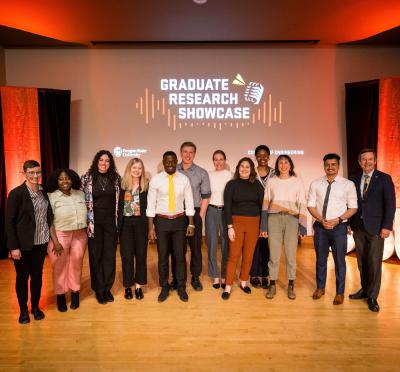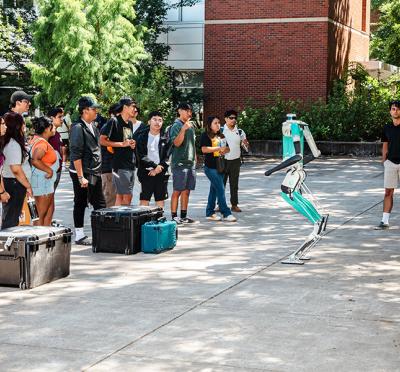The College of Engineering launched a unique program for graduate study in artificial intelligence in fall 2021, with an initial cohort of about 40 students. Oregon State’s program is the first in the United States to offer both master’s and doctoral degrees in artificial intelligence as an interdisciplinary field of study.
“AI is what I like to call the outward-looking face of computer science,” said Prasad Tadepalli, the new program’s director and a professor of computer science. “Much of computer science is associated with how to make computers faster, better, cheaper and easier to use. AI is more focused on how to apply computer science to other fields.”
In addition to offering courses and research opportunities in core AI topics — machine learning, knowledge representation, reasoning under uncertainty, sequential decision-making, natural language processing, and computer vision — the program allows students to choose relevant courses from a wide range of disciplines across the university.
The crux of artificial intelligence is using computers to make decisions. As machines have become more “intelligent,” the decisions we delegate to them have become more and more complex, even as the technology has become increasingly unnoticeable to users.
“People use AI every day without even thinking about it, every time they search Google or ask Siri for directions,” said Julie A. Adams, associate director of the Collaborative Robotics and Intelligent systems Institute and a professor of computer science.
The impetus to create the AI graduate program arose from CoRIS, which launched a similar interdisciplinary graduate program in robotics in 2014.
“Like robotics, artificial intelligence is a field that is going to have, and is already having, a vast impact in our lives — in consumer goods, technology used by first responders, government systems and more,” Adams said. “In the broader context of society, the goal of this program is to train individuals to be leaders in industry or academia, to start new companies, to make their own contributions to this rapidly expanding field.”
Previously, students could select artificial intelligence as an area of concentration in computer science. Oregon State’s computer science graduate program has typically accepted 30 to 40 AI-focused master’s and doctoral students from more than 400 applicants each year.
Colin Shea-Blymyer, a third-year doctoral student in computer science, is taking on artificial intelligence as a second major. His research broadly considers aspects of trustworthiness in AI. Specifically, he is examining ethical behavior and machine learning.
“The big question is how can we specify ethical obligations for autonomous systems? And then how can we do that democratically?” Shea-Blymyer said. “How can we get people involved in the process of turning beliefs about the way a system should work into specifications on how that system actually behaves?”
The new program provides an organizational framework for those working on these and other AI problems, Shea-Blymyer says. With that comes a higher level of autonomy and greater coherence within the group.
“It really makes that community more concrete,” he said. “And I think the multidisciplinary aspect — opening it up beyond the computer scientists and roboticists, bringing into the fold other people who are interested in using AI, being able to interact with them — I think that’s going to be very valuable. And that's why I'm here for it.”
It’s significant that Oregon State’s new program does not require a computer science degree as a prerequisite, said Alan Fern, associate head of research in the School of Electrical Engineering and Computer Science and a professor of computer science.
“Often students who are well-poised to study artificial intelligence don't come from a traditional computer science background,” he said. “The AI program is meant to be more flexible and will be enriched by having students with advanced knowledge in areas outside of computer science. Sometimes getting a domain expertise is much harder than getting the necessary expertise in computer science and statistics. People who have deep domain expertise plus knowledge and expertise in applying decision-making AI tools are going to be very highly sought in the job market.”
From an economic and strategic perspective, expertise in AI will be crucial for the United States to maintain its position as a world leader, Tadepalli says.
“People think of AI as the next industrial revolution,” he said. “Many advanced countries are very much aware of that and are investing a lot of money and resources and energy into AI. Being competitive in the world, in this century, will essentially depend on how well we can advance this field, not only making research advances, but also educating the public in the right ways of using the technology.”





